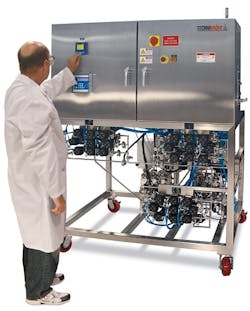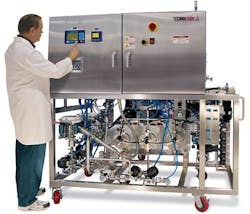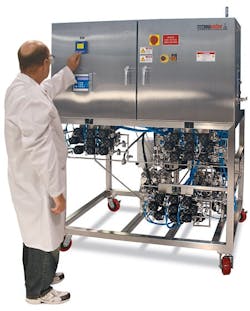In September, a group of scientists from Samchully spent a week in Evanston, Ill., doing pre-training and Factory Acceptance Tests (FAT) on cGMP oligonucleotide synthesis equipment that was engineered and fabricated for them by TechniKrom, Inc.
Samchully is in the midst of a US $20 million expansion of its cGMP manufacturing site in Sihwa, Korea. Its purchase of a 100-mmol oligosynthesizer and a 100-mmol HPLC purification system from TechniKrom will be a key component of our expansion project, says Dr. Moon-Hee Kim, Samchullys director of business development. When the expansion is complete, the plant will produce 10-15 kg of oligonucleotides per year.
We are targeting clients who are looking for mid-scale siRNA and aptamer supply, Kim notes. [This expansion] supports our continuing efforts to become a sole integrated supplier to drive down the costs of manufacturing for oligos, complementing our nucleoside monomer capability.
Kris S. Choi, Samchullys general manager of marketing and business development, explains, Our corporate vision is expansion in advance of the need, but not far in advance. Because Samchully is not a huge company, but executives were considering a major investment, we had to be careful about the timing of the expansion, says Choi. We talked with a number of pharma and biopharma companies and secured customers before embarking on this project.
An operator checks settings on TechniKrom's HPLC with "Adaptive PAT" capabilities.
Now, the renovation is nearing completion, and the TechniKrom equipment is due to arrive at the Sihwa plant by early November. Samchullys team will then finish the equipment qualification, and Choi says he expects the facility to be fully operational by December. Besides providing a significant increase in production capacity, the new equipment is introducing Samchullys operators to Process Analytical Technology (PAT) for the first time.
The Adaptive PAT aspect of TechniKroms chromatography equipment was definitely a factor in our decision to partner with them, Choi remarks. Based on what we know about the technology, we expect to gain better control of our product quality. Adaptive PAT claims to improve consistency by providing a more accurate mixing gradient for purification eluents. We should be able to strengthen our high-quality production as well as our analytical capabilities.
Right Time, Competence and Equipment
Samchullys agreement with TechniKrom reflects a parallel in the two companies growth curves, says Kimo Sanderson, TechniKroms vice president of client services. Were not a huge company, but were a growing entity with a strong reputation for providing quality products and services, he remarks. Samchully is at a similar place in its development. Thats an important element in our business relationship; neither of us takes our business for granted, so theres a mutual trust there.
Samchullys executives had known of TechniKrom; in fact, at a 2004 TIDES (Oligonucleotide and Peptide) conference, TechniKroms president, CEO and founder, Lou Bellafiore, had discussed his companys oligonucleotide purification equipment with Samchully personnel. At the time, TechniKrom was not manufacturing oligonucleotide synthesis equipment, but began doing so later that year at the request of another client. In 2006, when Samchully sought to substantially increase its oligonucleotide production capacity, the company contacted TechniKrom.
A TechniKrom engineer checks a 100 mmol oligonucleotide synthesizer prior to releasing it for shipping.
We were looking for an equipment vendor for oligonucleotide synthesis an alternative to the company that dominates that market, Choi recalls. We knew that TechniKrom had a good reputation for purification equipment; then we learned they had also begun manufacturing synthesis machinery as well. We were excited that they had a patented system that could meet our needs for both synthesis and purification equipment.
There arent many synthesizers available, and its not feasible to [test-drive] the equipment, Choi continues. However, weve discussed the engineering concepts with TechniKrom and we feel they are sound. We have also relied on recommendations from other companies that have had positive experiences with TechniKrom synthesizers. The market for oligonucleotides is not like the market for chemical APIs its a small community. If youre in this business, you know everyone else whos in this business.
Where Samchully is not particularly well known is its own homeland. The company used to make some branded drugs that were sold in Korean pharmacies, but that business was sold. Zoom out to the global scale, however, and Samchully is widely known in pharmaceutical and health care circles as one of the largest suppliers of HIV drugs, including zidovudine (commercial names: Retrovir or AZT). It has also established long-term relationships with multinational pharmaceutical companies such as GlaxoSmithKline, Novartis, Bristol-Myers Squibb and Roche.
Our vision for expansion is focused on drug development and API manufacturing, Choi notes. We are in a very active mode right now; we are anticipating the future needs of the pharmaceutical industry worldwide.


